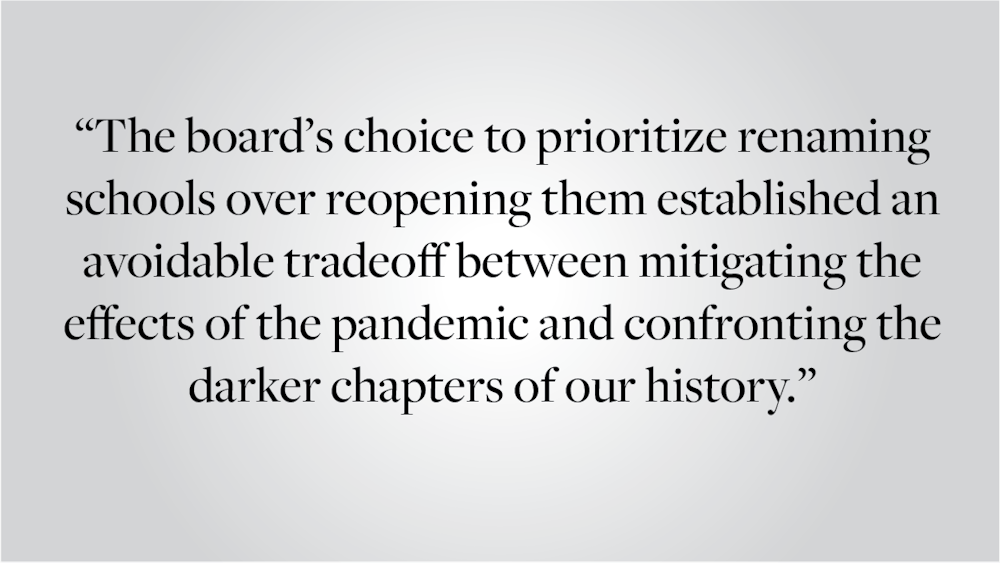On Sept. 7, efforts to recall the San Francisco School Board came to a head with the submission of more than 230,000 signatures in support of dismissing Gabriela Lopez, Alison Collins and Faauuge Moliga from office. This petition came as a result of growing discontent surrounding the board’s hesitancy to reopen schools despite months of low COVID incidence. As of early March 2021, the city’s daily case average was well below 50 infections, and throughout the entire pandemic never surpassed 400 cases per day. By comparison, Providence, R.I., with a population roughly a fifth of San Francisco’s, began reopening schools as early as January amid a rolling case rate that exceeded 1,300 infections per day. By all accounts, San Francisco was a model of adherence to public health guidelines, and the board should have brought kids back to school far earlier. However, rather than focus their efforts on opening schools, Lopez, Collins and Moliga engaged in what might best be described as a careless investigation into the figures whose names adorn the district’s buildings. Beyond ineffective policy, the move to rebrand public schools played directly into right-wing critiques of liberalism and invariably harmed the appeal of the national Democratic program by virtue-signaling over reopening schools.
The effort to rename the district’s buildings harkens back to 2018, when, following the Charlottesville riots, the board appointed a committee to reexamine the legacies of historical figures with schools named after them. Convincingly, the board argued that any individual who had “inhibited societal progress … or diminished the rights of those among us to life, liberty and the pursuit of happiness” was liable to have their name stripped from school buildings. The final tally of schools set to be rebranded included those named after Abraham Lincoln, Paul Revere, George Washington and Dianne Feinstein. While the board’s intentions were commendable, its ruling, voted upon in January 2021, was so contentious as to spark backlash from one of the United States’ most liberal cities.
According to the board’s findings, Lincoln’s name ought to be removed for his involvement in the 1862 execution of 38 Dakota men. Revisiting the legacy of anyone who persecuted Indigenous peoples is entirely justified. However, in the case of Lincoln, the school board’s assertion is at best a misrepresentation of events. In issuing their recommendation to strike Lincoln’s name from school buildings, the board failed to acknowledge that his involvement in the death of the Dakota men was not as an executioner but rather a defender. Following the U.S.-Dakota War of 1862, a commission of American military officers established a kangaroo court to try 398 Native prisoners, 303 of whom were sentenced to death. Urging restraint, Lincoln reviewed the transcripts of all 303 men and, rather than allow the executions to go unabated, petitioned that only those proven guilty of rape and civilian massacres be killed. As a result of his actions, 265 Native American men avoided the death penalty.
Such a misrepresentation of historical fact suggests that the board’s actions were effectively a means of pandering to a sense of moral superiority — in short, “virtue-signaling” while schools remained closed. I don’t mean to say there’s no value in reexamining the figures we idolize, but reestablishing in-person education ought to take precedence over renaming buildings.
The irony of renaming schools during the pandemic is that it directly undermined the board’s objectives. If the intention behind renaming schools was to create a more inclusive learning environment and address modern inequality, then the board should have pursued that goal more meaningfully and done everything within its power to get kids back in class.COVID has already had a disproportionate effect on communities of color. Asian American, Indigenous, Black and brown students are more likely to face remote learning challenges, whether that be due to linguistic isolation, crowded living conditions or inconsistent access to the internet. By keeping schools closed, the board only ensured that these educational inequalities persisted.
The board’s choice to prioritize renaming schools over reopening them established an avoidable tradeoff between mitigating the effects of the pandemic and confronting the darker chapters of our history. For those of us interested in pursuing a liberal agenda, it’s essential that we demonstrate that government can deliver policy that’s both effective and socially conscious. Unfortunately, the board’s actions played into the far right’s assessment of “liberal cancel culture” and damaged the image of the Democratic program. Indeed, Tucker Carlson ran a segment this past March on the San Francisco Board of Education’s decision to rename schools. While a biased and grossly exaggerated account, Carlson’s segment invariably harmed the national appeal of left-wing policies. Given the thin margin by which Democrats hold the House and Senate, it’s all the more important that we avoid playing into right-wing talking points. With control of the government, Democrats have an opportunity to show the merits of left-wing policies on the national level, and it’s incumbent on state and local governments to do the same. For San Francisco, the first step toward this ought to be recalling the school board.
Will Fleischmann ’22 can be reached at william_fleischmann@brown.edu. Please send responses to this opinion to letters@browndailyherald.com and op-eds to opinions@browndailyherald.com.





